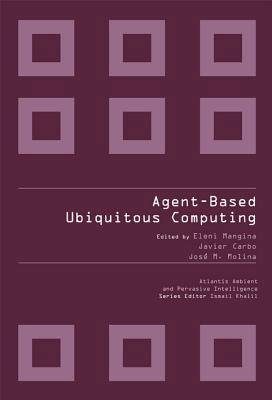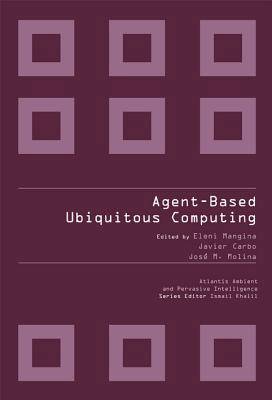
Bedankt voor het vertrouwen het afgelopen jaar! Om jou te bedanken bieden we GRATIS verzending (in België) aan op alles gedurende de hele maand januari.
- Afhalen na 1 uur in een winkel met voorraad
- In januari gratis thuislevering in België
- Ruim aanbod met 7 miljoen producten
Bedankt voor het vertrouwen het afgelopen jaar! Om jou te bedanken bieden we GRATIS verzending (in België) aan op alles gedurende de hele maand januari.
- Afhalen na 1 uur in een winkel met voorraad
- In januari gratis thuislevering in België
- Ruim aanbod met 7 miljoen producten
Zoeken
Agent-Based Ubiquitous Computing
€ 179,45
+ 358 punten
Omschrijving
Ubiquitous computing is the third wave in computing, where the widespread use of new mobile technology-implementing wireless communications such as personal digital assistants (PDAs) and smart phones enables a new type of advanced applications. In the past years, the main focus of research in mobile services has aimed at the "anytime, anywhere" principle (ubiquitous computing). However, there is more to it than that.The increasing demand for distributed problem solving led to the development of multi-agent systems. The latter are formed from a collection of independent software entities whose collective skills can be applied in complex and real-time domains. The target of such systems is to demonstrate how goal-directed, robust and optimal behavior can arise from interactions between individual autonomous intelligent software agents. These software entities exhibit characteristics like autonomy, responsiveness, pro-activeness and social ability. Their functionality and effectiveness has proven to be highly dependent on the design and development of the application domain or context.Context is the set of suitable environmental states and settings concerning a user, which is relevant for a situation-sensitive application in the process of adapting the services and information offered to the user. Agent technology seems to be the right technology to offer the possibility of exploring the dynamic context of the user in order to provide value-added services or to execute more and complex tasks. In this respect, agent-based ubiquitous computing can benefit from marrying the agent-based technology with the extensive use of distributed functionality, to be deployed for lightweight devices. It also enables the combination of ubiquity and intelligence in different application areas and enables to approach multiple research topics in computer science, artificial intelligence and engineering from a new perspective.
Specificaties
Betrokkenen
- Uitgeverij:
Inhoud
- Aantal bladzijden:
- 216
- Taal:
- Engels
- Reeks:
- Reeksnummer:
- nr. 1
Eigenschappen
- Productcode (EAN):
- 9789078677109
- Verschijningsdatum:
- 1/04/2009
- Uitvoering:
- Hardcover
- Formaat:
- Genaaid
- Afmetingen:
- 170 mm x 249 mm
- Gewicht:
- 489 g

Alleen bij Standaard Boekhandel
+ 358 punten op je klantenkaart van Standaard Boekhandel
Beoordelingen
We publiceren alleen reviews die voldoen aan de voorwaarden voor reviews. Bekijk onze voorwaarden voor reviews.








